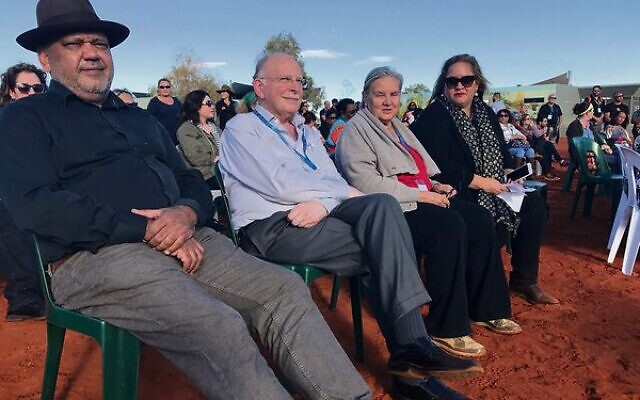‘An obligation to do something to right the wrongs of the past’
Prime Minister Anthony Albanese this week announced the wording of a referendum proposal for an Indigenous Voice to Parliament.

After Prime Minister Anthony Albanese announced the wording of a referendum proposal for an Indigenous Voice to Parliament, lawyer and high-profile Jewish community figure Mark Leibler described the proposal as a change in which “the downside is almost zero, and the potential upside is huge”.
Australians will be asked: “A Proposed Law: to alter the constitution to recognise the First Peoples of Australia by establishing an Aboriginal and Torres Strait Islander Voice. Do you approve this proposed alteration?”
While the Coalition agreed to the wording of the referendum proposal announced by Albanese on March 23, it has so far not indicated its support for a ‘yes’ vote. “I’m still hoping that the opposition will come around,” Leibler said, when contacted by The AJN.
Introducing a bill into Parliament on Thursday that will enable the referendum, Attorney-General Mark Dreyfus said Australia without constitutionally recognising its Indigenous people is “a nation missing its heart”.
Having viewed an emotional PM announcing the referendum’s wording last week, Leibler praised Albanese’s commitment, dating from his election-night acceptance speech. “There is no doubt that he’s absolutely sincere [but] that applies equally to someone like Julian Leeser [Shadow Attorney-General and Shadow Minister for Indigenous Australians].”
Leibler emphasised Australians will be asked to change the Constitution for the adoption of a principle only. The ensuing legislation, giving structure to the Voice mechanism, will be open to amendments as are any laws adopted by Parliament.
“This proposal will not create a Bill of Rights-type situation. The prospects of litigation which would in any way interfere with the Parliament are absolutely minimal – and that much has certainly been confirmed by a number of former judges of the High Court,” he said.
Leibler, national chairman of the Australia/Israel & Jewish Affairs Council, has been fostering Indigenous rights for decades. He co-chaired Reconciliation Australia in the 2000s, the Expert Panel on Constitutional Recognition of Indigenous Australians under PM Julia Gillard, and the Referendum Council leading to the Uluru Statement.
He was present when the Uluru Statement from the Heart was adopted by 250 Indigenous leaders in 2017, embracing a First Nations Voice, Makarrata (a treaty process) and Truth (a frank historical narrative of Indigenous Australians’ fate since European settlement).
The Statement from the Heart was “adopted with great acclamation”, said Leibler, and he was disappointed it has taken almost six years to realise a referendum.
“We may not be personally or directly responsible for the terrible harm wreaked on our First Australians, but I think we do have an obligation to do something to right the wrongs of the past,” he said. “The very least we can do is ensure that Indigenous Australians are appropriately recognised in the Constitution.”
Executive Council of Australian Jewry co-CEO Peter Wertheim stated, “The Australian people now know precisely which question the government wants them to say ‘yes’ or ‘no’ to at the referendum later this year. Although there are some notable exceptions, the preponderance of legal advice from practising constitutional lawyers and senior constitutional law academics is that the question is appropriately worded.
“The question for many will come down to whether a constitutionally enshrined Voice will be of practical benefit to First Nations people by giving them both an input into and a shared responsibility for government decision-making on matters that affect them.”

comments